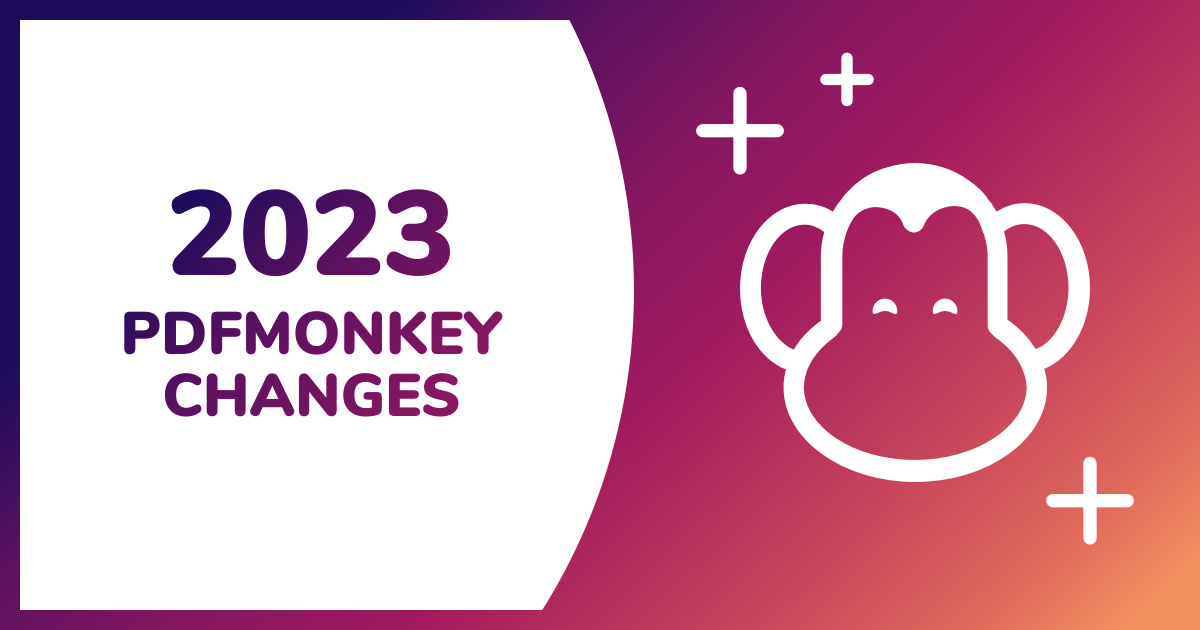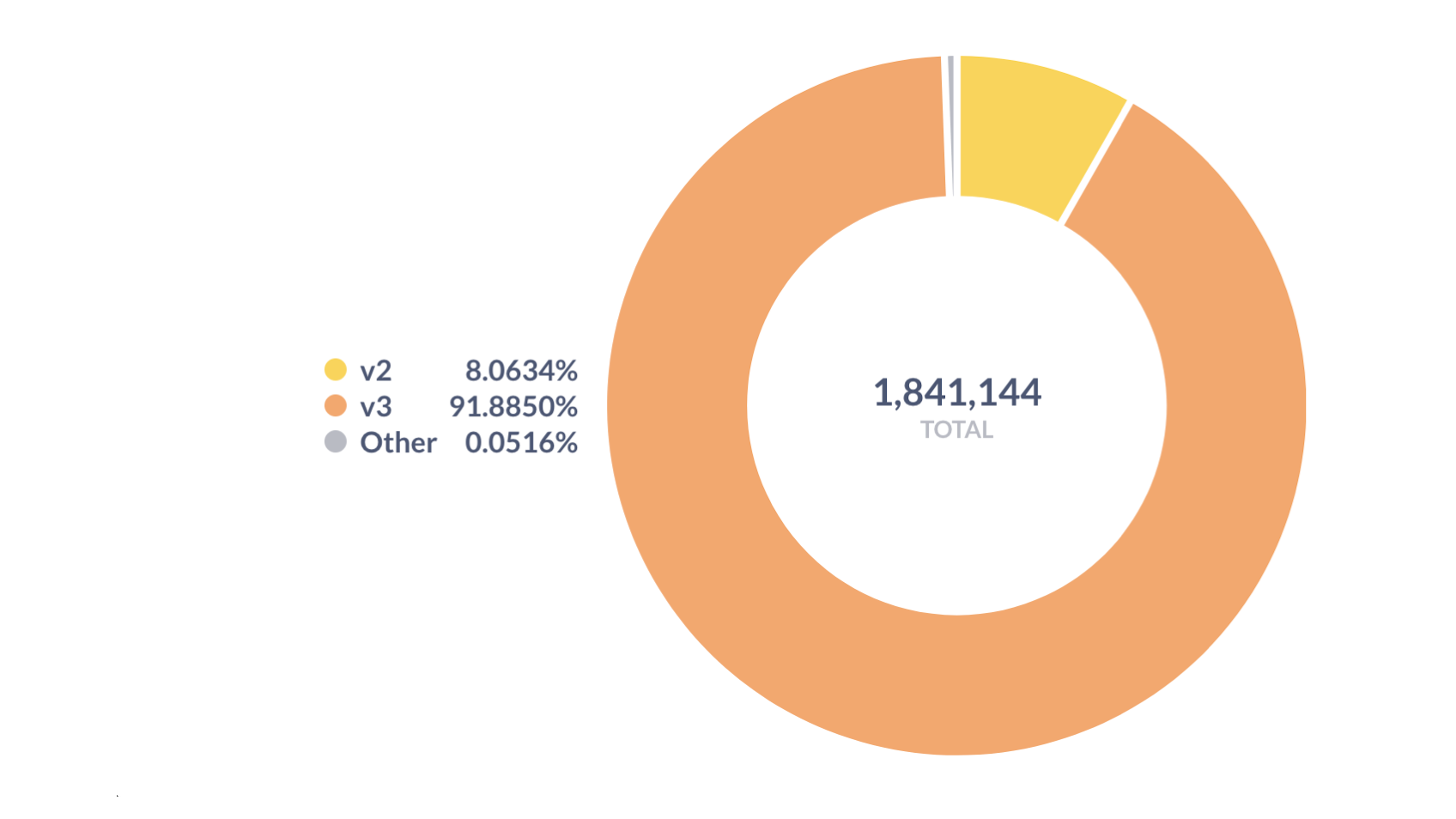
Blog / 2023 PDFMonkey changes
Year 2022 is now over. We’ve taken some time to reflect on the past year and what we want to achieve in 2023. We’ve made a lot of progress in 2022 and we’re excited to share some of the changes we’re planning for 2023!
TL;DR
Big changes
- We’re introducing a new Pro+ plan with Pro quota and Premium features
- We’re changing our documents retention policy depending on your plan
Other changes
- Documents
metafield will get a size limit of 200kb - Our Heroku add-on will be sunsetted
- We will plan for older PDF engines deprecation and pave the way for new ones
Introducing the Pro+ plan
We’ve been asked a lot about a plan that would combine the Pro quota and the Premium features. We’ve decided to introduce a new plan called Pro+ that will be available for 60€/month.
You will get an extended Pro quota of 5000 documents per month and you will also get access to the Premium features:
- Share links: Also known as “permalinks” allow you to have a permanent URL pointing to a document.
- Unlimited team members: You can add as many team members as you want to your workspace.
- Password protection: (once released) You will be able to password protect your documents.
Timeline: The Pro+ plan is already available and you can upgrade. Our pricing page will be updated before the end of Q1 2023.
Note: Following up on several questions, we’re not changing the pricing for Pro and Premium plans. If you have a Pro/Premium plan, you will keep the same price and quota.
Documents retention policy
We’ve been asked a lot about our documents retention policy and up until now we were always keeping your documents until you explicitly deleted them. We’ve decided to change this policy and we will now keep your documents for a limited amount of time depending on your plan.
Most documents are transient and are only needed for a short period of time, simply being sent by email and stored somewhere else. Despite this fact, our database gets more blotted every day with documents that will never be used again.
We hope that this change will help us keep our service snappy and reliable for everyone.
This also means that auto-deletion of documents will no longer be a paid feature!
Here are the new retention durations:
- Free plan / Pro trial: 1 day
- Pro plan: 1 week
- Premium plan: unlimited
Timeline: This change can be expected before the end of Q1 2023.
New meta field size limit
In 2022, we switched from a home-made webhooks solution to a service called Svix. Svix is a great service that allows us to scale our webhooks infrastructure and make it more reliable. However, it has a ~350kb limitation on the size of the messages you can send.
To respect this limit, we removed the payload field from the JSON we send to your endpoints.
A small portion of messages still gets rejected as the remaining data sometimes goes over the limit. To address this issue and ensure that all messages are delivered, we will limit the size of the meta field to 200kb.
The meta field’s purpose is to store information that should be available down the line when you need to access some information in your workflow. For example, you can store the email of the user the document is generated for, so that you can send them an email with the document upon webhook request.
Timeline: This change can be expected before the end of Q1 2023.
Heroku add-on sunset
In order to make PDFMonkey available in to the largest number of developers, we’ve created a Heroku add-on that allows you to easily integrate PDFMonkey in your Heroku apps.
Sadly, we’ve noticed that the add-on is not used as much as we would have liked and we never reached the production stage after several years.
We’ve decided to sunset the add-on and focus on other areas of the product.
Timeline: This change can be expected before the end of Q2 2023.
PDF engines deprecation
Over the years, we’ve developped several PDF engines that allowed for more and more features.
Some history
Engine v0, our very first engine, was based on the very often used [wkhtmltopdf][wkhtmltopdf] library. It was a great engine that allowed us to quickly get started and develop new features. However, it is very old and limited as the web engine hasn’t been updated since 2013!
Engine v1 was our first attempt at a more recent web engine. It is based on Chrome v69 and opened the door to modern styling like flexbox proper SVG support. However as time goes by it got a bit outdated and needed an upgrade.
Our next iteration was Engine v2, based on Chrome v79. A good upgrade that made generation faster and more consistent. Sadly, it also introduced issues text rendering issues that could happen with some templates.
Our latest engine is Engine v3, based on Chrome v86. It is a great engine that is fast and reliable. It also introduced support for emojis, thanks to the Noto Color Emoji font!
What’s next?
After monitoring the PDF engines usage, we were pretty happy to see that Engines v0 and v1 only represent 0.05% of all the documents generated over the last 6 months.

We’ve decided to deprecate these engines and eventually remove them from PDFMonkey. We will, of course, give you a heads up before we do so and will send emails to all the users that are still using these engines.
We will also be releasing a new engine that will be based on a more recent version of Chrome (v109). This will give you access to more modern JS and CSS features.
Some new PDFMonkey features will only be released on this new engine. We will also update the Dashboard to display the engine version used by each Template and make possible to safely test a different engine without publishing the Template.
Timeline: This change can be expected before the end of Q2 2023.
Conclusion
While we plan on introducing other changes in 2023, including some long awaited features, we think this changes are a necessary step to keep PDFMonkey the best PDF generation service on the market.
We hope you’ll like these changes and we’re looking forward to hearing your feedback!

Simon is passionate about development, tech, design and continuous enhancement. CTO and Co-Founder at PDFMonkey he supervises the development and evolution of the platform making sure the product always respects our core values.